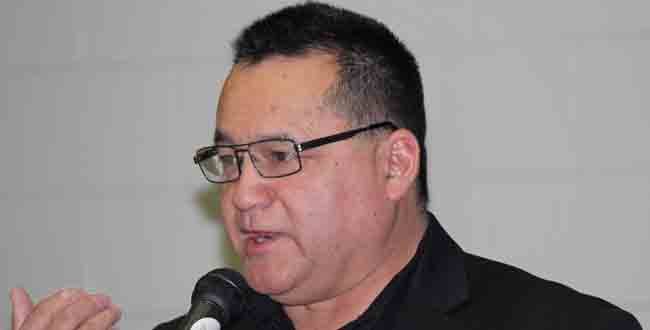Feds can’t be trusted on education: Madahbee

UOI OFFICES (Nipissing First Nation) May 26, 2014 – First Nations leaders are gathering in Ottawa to discuss how to move forward on creating an education system with a federal government they don’t trust.
Grand Council Chief Patrick Madahbee says Indian Affairs Minister Bernard Valcourt exacerbated the debate by referring to leaders working on a joint response to controversial First Nations education legislation as “rogue chiefs”.
“Calling down Chiefs who are invoking a charter right is not a good way to build relationships and create dialogue,” says the Anishinabek Nation leader, who will participate in Tuesday’s meeting in Ottawa. “To say that we don’t care about our own children or their education is insulting. It’s the very reason we are opposing Bill C-33, and the fact is the great majority of Chiefs right across the country oppose the bill.”
Madahbee said the minister’s attempts to portray the debate as a conflict between “rogue chiefs” and “good Indians” borders on racism.
The Grand Council Chief accused the federal government of using funding promises in hopes of dividing First Nations and pushing Bill C-33 through parliament before the summer recess.
“There’s nothing in the bill that reflects what the government is saying to the press. There’s no $1.9 billion mentioned, there’s no specifics on funding, yet all we hear on the news is how it’s the first time a federal government has increased funding in education.”
Bill C-33, the First Nations Control of First Nations Education Act, has been compared to the 1876 Indian Act by some First Nation Chiefs, and criticism of the proposed legislation led to the surprise May 2nd resignation of Assembly of First Nations (AFN) National Chief Shawn Atleo.
“The bill uses a one-size-fits-all approach and gives no guarantees for First Nation culture or language, but does make assertions on truancy and liability on First Nations,” says Madahbee. “Nearly every section of Bill C-33 reaffirms the Minister’s power and authority over First Nation education and still omits the government from any liabilities, putting the full onus on First Nation Chiefs and Councils, teachers and parents.
“This government is making a lot of promises about funding while they’ve done nothing but cut funding in every sector across the country. I for one don’t have any reason to believe government promises that come with no specifics. They’ve already admitted there’s a funding gap after they’ve been on record denying there was one.
“What more evidence do we need that they’re simply not trustworthy?”
At Tuesday’s meeting the AFN National Executive will discuss the timing and location for the election of a new National Chief and the approach going forward on Bill C-33 and First Nations control of First Nations education. The meeting is scheduled from 8.30 am. to 5 p.m. at the Westin Hotel in Ottawa, and the main plenary of the Special Chiefs Assembly will be webcast at www.afn.ca.


